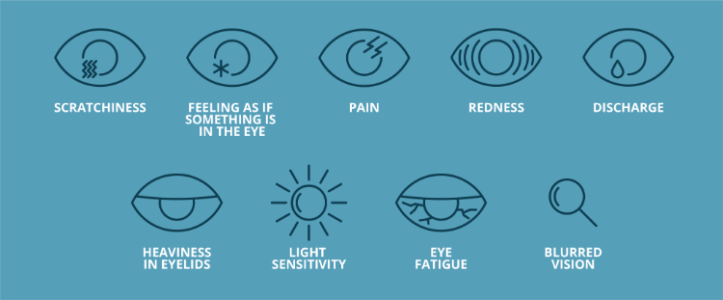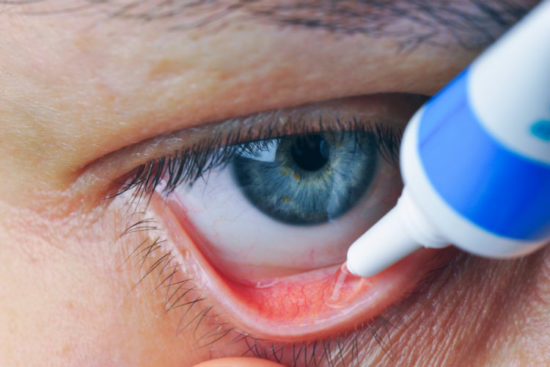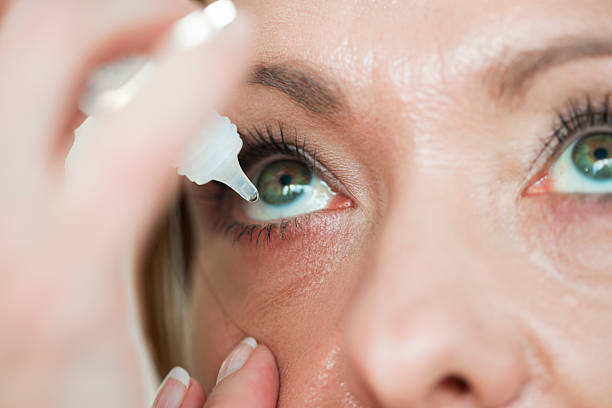Dry eye disease is a multifactor disease of the tears characterized by little tears secretion and high tears evaporation.(1)
Some dry eye symptoms include discomfort and painful sensation in the eyes, light sensitivity, blurred vision, tired eyes, etc.

What is the main cause of dry eyes?
According to the national eye institute, the leading cause of aqueous tear deficiency is primary and secondary Sjorgren Syndrome, obstruction disease of the lacrimal gland, and systematic effects of drugs. On the other hand, Evaporative dry eye is caused by environmental factors, lid aperture disorder, and individual behavior. (2,3)
Types of dry eyes syndrome
Evaporative dry eye
Evaporative tear deficiency is an eye condition caused by Meibomian gland dysfunction. This dysfunction clogs the glands and inhibits oils’ production, prolonging the time before tears evaporate. (4)
Aqueous tear deficiency
Aqueous deficient dry eye is the condition when the tear glands cannot produce sufficient tears for the eye’s lubrication.(5)
This type of dry eye is caused by the impairment of these tiny glands either by pollution, aging, or drug side effects. (3)
What is the best natural eye lubricant?
Omega 3-fatty acids supplementation
A 2019 meta-analysis study poses that Omega-3 supplementation improves dry eye syndrome in patients with dry eye disease. It can reduce inflammation and increase tear production from the tear glands. (5)
Change of environment
If the dry eye syndrome results from environmental factors, you may relocate to a safer environment. If you live in smoky places with thick clouds and dust, then a change of environment may help naturally treat dry eyes.
Proper nutrition
A 2020 study on the effects of nutrition on dry eye disease suggests that proper nutrition with sufficient vitamins, minerals, and fatty acids may help relieve several dry eye symptoms.
Another medically reviewed study found that the Mediterranean diet with extra virgin olive oil and nuts effectively affects dry eyes. (6)
Eat a balanced diet for all the body’s nutrients to be healthy.
How can I hydrate my eyes?
There are several home remedies for dry eyes that can take care of mild and temporary instances of eye irritation. some of these natural remedies include:
Hydrate
A meta-analysis study found that dehydration of the system can be one of the causes of dry eye disease. Another peer-reviewed study concludes that individuals with dry eye in the study had higher Plasma osmolality indicating that body hydration is an essential factor in dry eye. (7,8)
Keep your body hydrated by drinking at least 8 glasses a day. Nothing will improve your tear quality like sufficient fluids in your system. Nothing lubricates the eyes like your own tears.
Use a humidifier to add moisture to the room
A 2014 study proves that adverse air conditions and pollutants affect the ocular surface and the lacrimal layer composition causing dry eye syndrome. Peer-reviewed studies in Delhi show that prolonged exposure to air pollution may cause tear film abnormalities. (8)
According to a national institute of health publication, air pollution and weather conditions have various adverse effects on the symptoms and signs of dry eye. The same study recommended humidifiers and plants to address environmental contributors to dry eye syndrome. (9)
A medically reviewed study affirms that desktop humidifiers can improve tear-film stability and comfort during computer use. (10,11)
Stay away from smoke
Scientific studies prove that the relationship between smoking and dry eyes is very significant. Another medically reviewed study found that passive smoking may cause dry eye disease in children living with smoking parents. (12,13,14)
A 2012 research found that smoking affects the precorneal lacrimal layer of the eye and can cause aqueous tear deficiency disease.
Therefore it’s advisable to keep away from smokers, and if you smoke, you need to stop to curb lacrimal keratoconjunctivitis.
Keep your eyes blinking
Research done in 2021 proves that blinking exercises can improve dysfunctional dry eye symptoms. Another study associates incomplete blinking of the eye with Meibomian gland obstruction and loss of tear layer homeostasis. (15)
A 2008 study concluded that suppression of blinking the eye when using a screen deteriorates optical quality.
Use non-preservative artificial tears or lubricating eye drops

The use of preservative free eyelid cleanser or ocular lubricants may help improve the condition of your ocular surface. Significant reduction in tear evaporation resulted from the use of artificial tears. The emulsion drops used in the study showed a decrease in osmolarity, corneal stating, and improved tear stability. (16,17)
Although a peer-reviewed survey in 2019 shows no difference in the effects of preservative and preservative free artificial tears, some individuals are affected by the preservatives in eye drops.
If you are such a one, kindly consult with your doctor over the best artificial tears you can use to help you treat dry eyes.
Use wraparound sunglasses

Wear wraparound sunglasses to increase periocular humidity, reduce dry air striking the eye, and render ocular comfort to patients. Another study supports the suggestion based on the use of moisture chamber eyeglasses that improves the symptoms of dry eyes. (18,19,20)
A 2016 research study shows that those who wear sunglasses to protect the eye from short-wavelength blue light can reduce visual impairments due to tear instability in dry eye patients.
Take computer screen breaks
Prolonged visual activities aggravate keratoconjunctivitis sicca disease. Therefore it’s advisable to take breaks from screens. (21)
According to the international journal of Ophthalmology, a high prevalence of clinically diagnosed dry eye disease is in young and middle-aged video display terminal users. (22)
Use an air filtration system at home
Particles in the air may cause dry eye disease or worsen the symptoms. Using air filters, you may ensure that the air in your room is free from these eye irritants that may worsen dry eye symptoms. (23)
A 2020 study further affirms that exposure to indoor and outdoor air composition can influence tear production.
Try a warm compress
A scientific study of 2003 recommends warm compress treatment on the eyelids to help treat Meibomian gland dysfunction. Further research shows that not any compress is efficacious, but the bundle method with the heat of 40˚C. (24)
A warm compress may increase tear film thickness and stability and improve Meibomian glands function, thus easing dry eyes.(25)
Although the traditional warm compresses may help with dry eye symptoms, a 12-minute vectored thermal pulsation treatment is more efficacious with Meibomian gland dysfunction. Remember to use this home remedy on closed eyes. (26)
Gently massage upper and lower eyelids using baby shampoo
A 2012 ophthalmologist study suggests that dry eye disorder is not easily overcome with medications alone but requires lifelong eye lids hygiene.
To produce higher quality tears, you can gently wash the upper and lower eyelids with warm water with mild soap. Then gently massage the closed eye at the base of the eyelashes.
In a peer-reviewed study done in 2017, researchers found that cleansing the eyelids with ointments is effective for patients with Meibomian gland dysfunction.
In a 2020 study involving patients with grade 2 Meibomian gland dysfunction, the efficacy of eyelid scrub using baby shampoo was very positive.
Avoid contact lenses

Several scientific studies associate contact lenses with discomfort, which may cause dry eye disease.(27)
A 2013 study found a high correlation between long-term contact lens wearers and dry eyes disease. Another study affirms that slight disturbances to the contact lens may cause damage to the ocular surface.(28)
Apply lubricating eye drops
Lubricating gels coat the eye and bring a lasting relief than average artificial tear drops. However, only use them while going to bed, for they may cause blurry vision due to their thickness.
More research is still on the effects of these ointments in the long term, but you may consider seeking advice from your doctor on how and how to use lubricating gel for your dry eyes.
Add vitamin D, B12, and A to your diet
Another trick to help you keep your eyes moist is to add these vital vitamins to your diet.
A 2020 study poses that vitamin D plays an essential role in eye health. Vitamin D deficiency has been shown to associate with eye dryness.
In 2019 a study showed that oral vitamin A supplementation could improve quality tears though the quantity is still anecdotal, and boost ocular health conditions.(29)
2021 in vivo study proved that mucoadhesive gel of vitamin B12 has the same effects as marketed eye drops.
Avoid alcohol intake
Alcohol consumption leads to intense dehydration, which may affect your eyes. Alcohol consumption will affect your eyes and overall health conditions.
Reduce make-ups or facial creams
You may sweat, and these chemicals can get into the tear film and potentially irritate the eyes. If this is the case, you can use a clean washcloth and warm water to loosen clogged oils on the eyelids.
What foods help to cure dry eyes?
Leafy greens: Packed with several vitamins that are good for your eye health. Vegetables are high in antioxidants and anti-inflammatory properties that will help keep your Meibomian glands healthy. Lutein in the leafy greens can also help manage age-related macular degeneration. (30,31)
Nuts: Anti-inflammatory effects of nuts and the oils are good for eye health.(32)
Seeds: Chia seeds and flax seeds have sufficient Omega-3 fatty acids and other essential fatty acids that improve lubrication of the eyeballs. You don’t need fatty fish oil supplements if you can get Omega -3 fatty acids.
Legumes: High legume consumption of legumes can protect from incidences of cataracts.(33)
Risk factors for dry eyes
Age: Individuals past the age of 65 are prone to develop eye problems.
Smoking: Several scientific shreds of evidence show the relationship between cigarette smoking and eye dryness
Environments extremes: Scorching air irritates the eye, and freezing winter affects the eye.
Low blink rate: When glued to a screen, you seldom blink sufficiently to lubricate the eye ball.
Vitamin and minerals deficiencies: Low vitamin d, A, and B6 will increase your risk of having meibomian issues.
Autoimmune conditions: Conditions like lupus are linked to eye dryness.
Chronic diseases: Diseases like diabetes may increase your risk of having eye problems.
What causes dry eyes
Besides environmental conditions and the inability to produce enough tears, some medications and treatments may cause dry eye syndrome. These include:
- Parkinson’s disease medications
- Depression drugs (Anti-depressants)
- High blood pressure drugs
- Nasal decongestants
- Antihistamine drugs
- Medications for acne
- Oral contraceptives and hormonal therapy
When to see an eye doctor for dry eyes
Adopting these simple home remedies for dry eyes or lifestyle changes can help your eyes regain moisture. However, it’s right to see an eye doctor when you realize little relief after using these home remedies or feel like it’s a severe problem.
Your doctor will conduct an eye exam to diagnose the root cause of your dry eyes and advice you accordingly.
Here are some of the dry eye symptoms that may make you seek medical advice:
- Symptoms persist after a few days of using remedies
- Discharge from the eye
- Dry mouth
- Redness and swelling
- An injury on the eye
- Pain that supersedes mild eye irritation
Summary
Eye dryness may cause a condition called photophobia if it remains untreated for long. Ensure you use these natural remedies for dry eyes to find relief.
It would be best if you had a diagnosis from an eye doctor so that you may know the underlying cause of your problem before using any remedies for dry eye.
Chronic cases of eye dryness may cause damage to the eye’s surface and several other eye complications.

